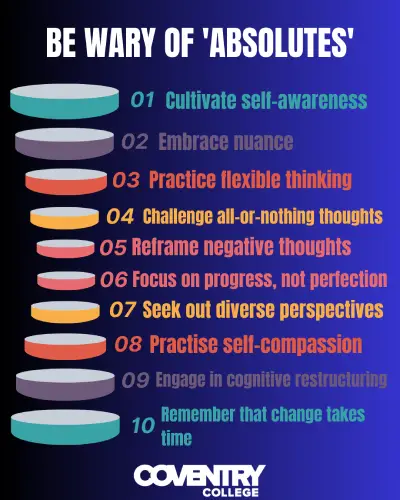
Being wary of absolutes means recognising that extreme or rigid thinking patterns can create unnecessary obstacles in your life. Here are some tips to help you identify and overcome this type of thinking:
Cultivate self-awareness:
Be mindful of your thoughts and emotions, and observe when you tend to use absolute terms like “always,” “never,” “must,” or “should.” This awareness can help you challenge and change these thought patterns.
Embrace nuance:
Understand that most situations are complex and rarely black or white. Embracing the grey areas and nuances can help you make more balanced decisions and avoid getting stuck in extreme viewpoints.
Practice flexible thinking:
Learn to adapt your thinking and beliefs in response to new information or circumstances. Flexible thinking can help you navigate through obstacles more effectively.
Challenge all-or-nothing thoughts:
When you catch yourself thinking in absolutes, ask yourself if there’s any evidence to support this belief or if there are alternative explanations. This can help you develop a more realistic perspective.
Reframe negative thoughts:
Replace absolute thoughts with more balanced, rational ones. For example, instead of thinking, “I always mess up,” reframe the thought as, “I’ve made mistakes in the past, but I can learn from them and do better next time.”
Focus on progress, not perfection:
Recognise that nobody is perfect, and it’s unrealistic to expect yourself or others to be. Focus on making progress and learning from your experiences rather than striving for perfection.
Seek out diverse perspectives:
Engage in conversations with people who have different viewpoints or backgrounds. This can help you gain a broader understanding of issues and challenge your own beliefs.
Practice self-compassion:
Be kind and understanding towards yourself when you notice rigid thought patterns. Acknowledge that it’s a normal part of the human experience, and gently guide yourself towards more balanced thinking.
Engage in cognitive restructuring:
This is a technique used in cognitive-behavioural therapy (CBT) that involves identifying and changing irrational thought patterns. Working with a mental health professional can help you develop this skill.
Remember that change takes time:
Developing more balanced thinking patterns is a gradual process that requires consistent effort and patience. Celebrate your progress and be patient with yourself as you work towards overcoming absolutes.


